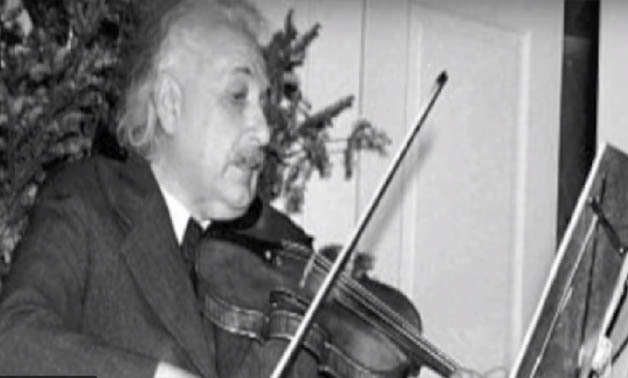
Albert Einstein playing sonata for Mozart (Photo: still from video
CAIRO - 10 July 2017: The prominent scientist and physicist Albert Einstein was also known as an amateur violinist. He devoted some of his passion to music, according to a report published in 2005 titled ‘World Year of Physics.’ Egypt Today sheds the light on the ambiguous musical side of the renowned scientist.
The press used to describe Einstein as “the renowned scientist, jigger pacifist, Zionist fundraiser, and a dash amateur musician.” He used to share chamber music with several of his acquaintances, and has learned violin lessons at an early age of his life, according to the report.
The musical side of Einstein comes as no surprise. He showed interest in music from the age of 13, and enjoyed playing sonatas for the classic music composer Mozart.
His mother Pauline Koch Einstein was a pianist. She taught him piano and violin lessons from his early childhood, according to an article by CMUSE.
During his many years in Berlin, Germany, Einstein was deeply integrated in the city’s cultural and scientific life. He met with famous musician Fritz Kreisler and philosopher/artist Artur Schnabel, and played violin sonatas with Max Planck. Planck was a physicist that discovered The Quantum Theory.
He also carried out sessions of quartets along with his acquaintances. He played songs composed by classical musician Schubert; however Einstein had a special preference to playing music composed by Austrian classical composer Joseph Haydn. He would always play Haydn’s music every time the quartet met.
Einstein played his violin regularly. It is reported that he had good technique and did not play out of tune. He was also familiar with music literature, and kept himself abreast with it up to the current times.
Not only was he an amateur musician, but also showed a selective taste in music. He was once quoted in an interview with Jerome Weidman from Reader Digest, “I admire German composer Richard Wagner’s inventiveness, but I see his lack of architectural structure as decadence.
Moreover, to me his musical personality is indescribably offensive so that for the most part I can listen to him only with disgust.”
In 1939 he described French compose Claude Debussy in a questionnaire as, “delicately colorful and shows poverty of structure.” He also mentioned that he could not provide any enthusiasm for that sort of music.
Comments
Leave a Comment